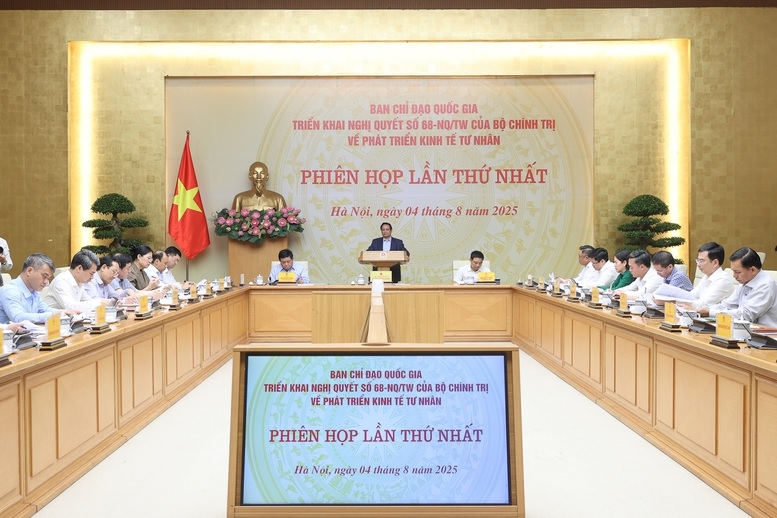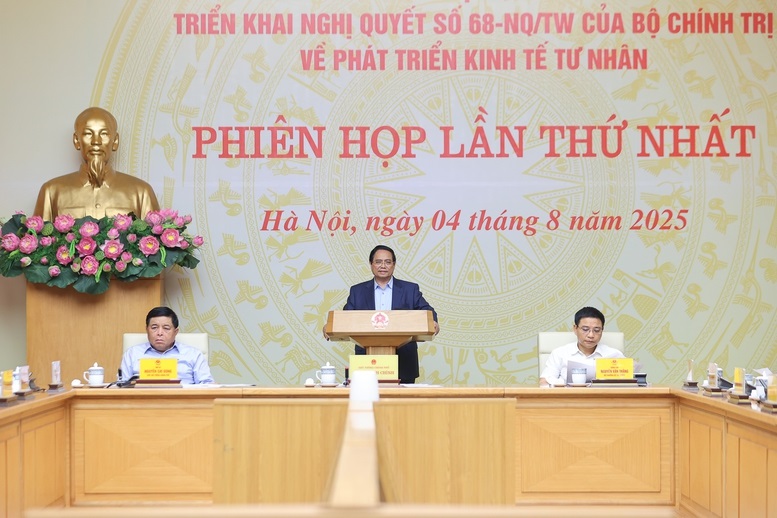
The first meeting of the National Steering Committee for the implementation of Resolution No. 68-NQ/TW of the Politburo on private sector development – Photo: VGP/Nhat Bac
|
Reports and opinions at the meeting evaluated Resolution No. 68-NQ/TW on private sector development as one of the four resolutions of the Politburo that are considered “pillars” for the country’s development in the coming time.
The resolutions of the Politburo, National Assembly, and Government have been synchronized and comprehensive, with vigorous, consistent, and well-organized implementation, and have received special attention and strong support from society, Vietnamese business associations, and international public opinion…
At the meeting, the Ministry of Finance – the Standing Agency of the Steering Committee – reported on the implementation of Resolution 68. The delegates focused on reviewing the implementation of tasks and solutions within the competence of the action plans of the Government, ministries, sectors, and localities; the achievements, existing limitations, and causes.
The delegates also assessed the level of trust among businesses and society in implementing the Resolution; identified obstacles and bottlenecks in the relevant institutions and laws that need to be addressed; reviewed administrative procedure reform, business environment improvement, decentralization coupled with resource allocation and enhanced inspection and supervision; and proposed solutions to meet practical requirements and identified key tasks to be implemented in the last six months of 2025.
Concluding the meeting, Prime Minister Pham Minh Chinh emphasized the outstanding points and positive results in the implementation of Resolution 68 over the past time: renewed thinking and more decisive actions; spread of trust; issuance of more institutions and policies focusing on resolving difficulties and obstacles for businesses; an increase in the number of newly established enterprises; and large enterprises boldly proposing major projects for the country such as railways, nuclear power, expressways, airports, and seaports.

The Prime Minister requested persistence in the goals set in the resolutions of the Politburo, National Assembly, and Government – Photo: VGP/Nhat Bac
|
Along with this, the three breakthrough strategies (institutions, infrastructure, and human resources) to serve the development of enterprises have been promoted; the three levels of government (central, provincial, and grassroots) have reduced administrative procedures, compliance costs, and facilitated people and businesses; public-private partnerships have been promoted with the Law on Investment in the form of Public-Private Partnership revised; and ministries and sectors have coordinated more closely to resolve enterprises’ difficulties.
However, the Prime Minister frankly pointed out that, overall, the progress is still slow compared to the requirements, especially in terms of mechanisms and policies that meet the stronger, faster, and more effective development of enterprises; administrative procedures and decentralization remain problematic at the central and local levels; and support resources are limited in terms of both mechanisms, policies, and financial resources.
For the coming period, the Prime Minister requested persistence in the goals set in the resolutions of the Politburo, National Assembly, and Government, in line with specific circumstances and conditions, meeting the demands of enterprises, with the general objective of making the private sector the most important driving force of the economy.
Identifying 15 specific groups of tasks and solutions, the Prime Minister directed to continue raising awareness, changing thinking, and taking more decisive actions to create momentum, inspire, and create a trend of private sector development in the new context; spread trust among the people, businesses, and international friends.
The ministries and sectors continue to promote the resolution of institutional bottlenecks; review, amend, supplement, and perfect laws, decrees, and circulars related to taxes, fees, charges, land access, natural resources and minerals, interest rate support, human resource training, administrative sanctions on competition, science and technology, and digital transformation…, making institutions a competitive advantage.
The Government Office shall develop a roadmap to reduce procedures, time, and costs for implementing administrative procedures; promote decentralization and delegation of authority to localities in handling administrative procedures.
Localities shall supplement and perfect planning to develop new projects, publicly call for investors to access equally, openly, and transparently.
The Prime Minister requested to strongly promote the three breakthrough strategies, with institutions being open and reducing compliance costs, infrastructure being smooth to reduce input costs and create new development space and new value, and human resources training meeting the requirements of enterprises’ transformation. There should be a mechanism to mobilize preferential capital for private enterprises, especially in the development of science and technology, innovation and digital transformation in accordance with Resolution 57 of the Politburo.
The Ministry of Finance shall develop a group of policies to support small and medium-sized enterprises and household businesses in terms of taxes and tax procedures, tax connection, and promotion of household businesses becoming enterprises, small enterprises becoming large enterprises, and large enterprises becoming global and multinational enterprises. The Ministry of Finance is also assigned the task of building a mechanism to support infrastructure (electricity, land rent, fees, and charges).
The Prime Minister also requested the development of criteria to measure the satisfaction of people and businesses, criteria to reflect the results of serving the people and businesses. The Ministry of Home Affairs shall guide and propose emulation and rewards on the occasion of the 80th anniversary of National Day and Vietnam Entrepreneurs’ Day (October 13th).
The Prime Minister directed 18/34 localities that have not yet built to develop plans to implement the Resolution. Along with that, the Private Sector Development Research Board of the Advisory Council for Administrative Procedure Reform continues to grasp and evaluate the implementation of the Resolution, ensuring accuracy, without embellishment or distortion.
Emphasizing that the tasks to be completed by the end of the year are very heavy, the Prime Minister requested ministries, sectors, and localities to raise their sense of responsibility, strengthen supervision, inspection, and urging, and solve their own problems.
Along with this, enhance dialogue, listen to each other’s opinions, and participate in building institutions, mechanisms, and policies of enterprises, household businesses, and people; build a supervision mechanism, strengthen the supervision of the Vietnam Fatherland Front and socio-political organizations; and develop plans to supervise localities.
Assigning the Ministry of Finance to build a plan for implementation from now until the end of the year, the Prime Minister suggested that all levels, sectors, and members of the Steering Committee continue to promote the sense of responsibility, unity and consensus, and join hands and hearts, “the whole country is one army, marching towards the goal must be swift and bold, winning must be sure, ensuring both immediate and long-term requirements”, deploying synchronously, comprehensively, effectively, and more urgently the tasks and solutions set out in the resolutions, “turning nothing into something, turning difficulties into advantages, and turning impossibilities into possibilities”, “resources come from thinking, motivation comes from innovation and creativity, and strength comes from the people and businesses”.
The Prime Minister emphasized the requirement to implement substantially and decisively, to keep the commitment and turn it into action, and to produce products when implementing, on the spirit of “6 on-the-spots”: on-the-spot person, on-the-spot job, on-the-spot responsibility, on-the-spot time, and on-the-spot product”; bringing the Resolution to life, creating a trend and momentum, and the ultimate measure is the effectiveness of the private sector and private economic contribution to socio-economic development, contributing more and higher to GDP, breaking through in science and technology development, innovation and creativity, increasing labor productivity, and stepping into a new era with the whole country.
– 08:35 05/08/2025
“Proposed Tax Rate of 20% on Taxable Property Income”
The proposed introduction of a 20% tax rate on taxable real estate income has not been implemented. Instead, the current practice of levying a 2% tax on transaction values remains in place.
“Finalizing Staff Benefits: Supporting Affected Personnel Post-Restructuring”
“Vietnam’s top decision-making bodies, the Politburo and the Secretariat, have issued a directive to promptly address and finalize the benefits and entitlements of officials impacted by the recent organizational restructuring. These bodies have set a deadline of August 31st, emphasizing the urgency and importance of resolving these matters without delay.”
The Smallest Province in Vietnam Prepares for Take-off: Aiming for Special Centrally Governed City Status by Next Year
The smallest province in Vietnam has just released an official document regarding the proposal to establish a centrally-administered city.




















